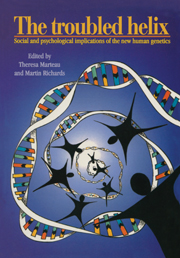Preface to the paperback edition
Published online by Cambridge University Press: 01 June 2011
Summary
It is now approaching four years since we completed work on the original edition of The Troubled Helix. How have things changed since? As we commented then, each week brings reports of the identification and cloning of new genes, but as we also said, from the perspective of families these have been little more than promises of future developments that might alleviate some of the burden of inherited disease that some carry. Both comments remain accurate today. This year has brought the inauguration of the American Society for Gene Therapy and it is thought that a couple of hundred gene therapy experiments may be underway, but it is unlikely that more than a handful of people have yet benefited from these techniques. This number will, of course, rise but there is every indication that it will be a much slower and rockier road that many researchers and their funders would even now want to admit publicly.
Direct genetic testing has also proved rather more complicated than some of the earlier examples, such as that for Huntington's disease, suggested. This is well illustrated by what has happened in the testing for the two genes that have dominantly inherited mutations associated with breast and ovarian cancer, BRCA1 and BRCA2. BRAC1 was cloned in late 1994 and BRCA2 soon followed; however, today most of those who on the basis of their family history would appear to be at high risk of carrying mutations of one or other of these genes still cannot be offered genetic testing because no mutation can be found in their family.
Information
- Type
- Chapter
- Information
- The Troubled HelixSocial and Psychological Implications of the New Human Genetics, pp. xvii - xixPublisher: Cambridge University PressPrint publication year: 1996
